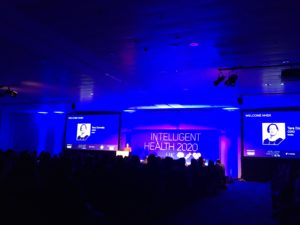Will the NHS be transformed by the power of artificial intelligence?
Posted on
Dr Natalie Savage, Project Manager DigitalHealth.London Accelerator, reflects on the Intelligent Health UK 2020 summit earlier this month.
The promise of artificial intelligence (AI) in healthcare has long been anticipated. It has been argued by many that the NHS took a momentous step closer to realising that promise when, in August 2019, Health Secretary Matt Hancock announced a £250m investment to create a new National AI Data Lab, then further, in January 2020, when the opening of applications for a new AI in Health and Care Award were announced. Part of the £250 million funding given by the Department for Health and Social Care to NHSX, the AI award will make £140m available over three years to accelerate the validation and evaluation of AI technologies with the greatest potential that address the strategic aims as identified in the NHS Long Term Plan.
So how can AI help the healthcare sector? Application of AI in health has been shown to provide benefit in diagnostics, knowledge generation, public health, system efficiency, and precision medicine. But will the more widespread use of AI live up to its expectations and finally help to convert healthcare data into transformational insight?
Intelligent Health UK 2020
Earlier this month, Intelligent Health UK 2020 was held in London. This event, termed the World’s Leading AI in Medicine Summit, brought together over 1000 delegates and 35 industry-leading speakers within the global AI and health community to break down barriers between technology and healthcare by advancing discussions on the application of AI. This one-day event addressed several key themes, including how physicians can use AI to adopt data-driven thinking in hospitals, the areas in which technology solutions can make the biggest impact on healthcare, how agility and innovation can be fostered in the NHS, and how personalised healthcare may be delivered in a big health system.
Key messages of the Summit
Tara Donnelly, Chief Digital Information Officer at NHSX, described how the NHS will endeavor to work more effectively with larger technology firms and digital health developers to lead the essential movements of digital change, interoperability, and innovation. Tara described a number of examples of the areas in which AI-driven technology is already making a difference by tackling real problems for the NHS, including early dermatological detection of cancerous pigmented skin lesions by DigitalHealth.London Accelerator programme alumni Skin Analytics, and prevention of unplanned hospital care through early detection of patients likely to attend A&E by another alumnus from our programme, Health Navigator. Tara consistently reinforced the importance of real-world validation and evaluation, a term that is growing with an increasing amount of emphasis as digital health companies must overcome the challenges and meet the evolving standards for the evidence generation requirements of their technologies to support adoption within the NHS.
Frank Hester, Founder and CEO of The Phoenix Partnership, focused on the importance of maximising the digital infrastructure of the NHS. Frank introduced a message that would become one of the predominant themes of the day, that a key advantage of AI technologies in healthcare would be to give clinicians back their time, a statement often made to NHS organisations by digital health innovators. This raised the important question: will advancements in technology pose a risk to the value of the clinician? Frank described how AI should deliver essential time savings through augmentation of the multidisciplinary workforce, supported by a resonating quote from a recently published correspondence in The Lancet:
“Machines will not replace physicians, but physicians using AI will soon replace those not using it”.1
The importance of data quality
A refreshing and reassuring highlight was delivered by Dr Allison Gardner, Programme Director for the Data Science Degree Apprenticeship at Keele University and Co-Founder of Women Leading in AI. Dr Gardner boldly challenged some of the views presented earlier in the day by diving into “Pandora’s Black Box” to demonstrate the paramount importance of maintaining decision-making in diagnostic AI and its implications for the skill sets of clinicians. This suggested that it would be prudent to consider that the utilisation of AI in health and care is likely to confer some level of risk to the skill levels of clinicians, therefore reinforcing the need for safeguarding standards and practices that mitigate this risk.
Dr Gardner also discussed the important issues surrounding data protection and ethics, algorithmic bias, and the need for diversity. Whilst algorithms have become considerably more complex, the same challenges of bias are still faced. Bias may be introduced into algorithms through biased human decisions included in the training data, or by flawed data sampling secondary to under- or overrepresentation of certain demographic groups. As such, Dr Gardner collectively emphasized that the quality of an algorithm is highly dependent on the quality of the data against which it is trained.
The need for research and development
It is widely apparent that it is an exciting time for technology in the healthcare sector. But to truly overcome the barriers and take advantage of the many ways by which AI can enhance conventional human decision-making, there must be an adequate level of regulation and governance enforced that ensures data quality and data protection whilst preserving clinical autonomy. Digital health companies are currently looking to deploy their AI technologies across NHS organisations, I hope that the AI in Health and Care Award will provide the imperative support that is needed for research and development as well as validation in the real-world setting.



